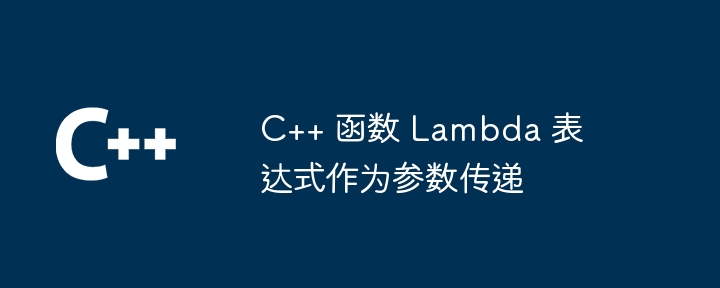
C's Lambda expression can be passed as a parameter to other functions, the syntax is: auto lambda_function = [](parameter_list) -> return_type { ... }. For example, the for_each function receives as arguments a vector and a lambda expression that performs a specified operation (such as printing the vector elements to the console).

C function Lambda expression is passed as a parameter
Lambda expression is a small anonymous function that can be passed as a parameter to other functions. This is useful when one or two lines of code need to be passed as parameters.
Syntax
auto lambda_function = [](parameter_list) -> return_type {
// lambda 函数体
};Example
The following is an example of a C function receiving a lambda expression as a parameter:
#include <iostream>
#include <vector>
using namespace std;
void for_each(const vector<int>& v, function<void(int)> f) {
for (int i : v) {
f(i);
}
}
int main() {
vector<int> v = {1, 2, 3, 4, 5};
// lambda 表达式作为 for_each 函数的参数
for_each(v, [](int i) {cout << i << endl; });
return 0;
}Output
1 2 3 4 5
In this example, the for_each function accepts a vector and a lambda expression as parameters. A lambda expression is used as a callback function that performs a specified operation on each vector element (in this case, the output element).
The above is the detailed content of C++ function Lambda expression passed as parameter. For more information, please follow other related articles on the PHP Chinese website!
 What are the differences between c++ and c language
What are the differences between c++ and c language
 Recommended learning order for c++ and python
Recommended learning order for c++ and python
 Cost-effectiveness analysis of learning python and c++
Cost-effectiveness analysis of learning python and c++
 Is c language the same as c++?
Is c language the same as c++?
 Which is better to learn first, c language or c++?
Which is better to learn first, c language or c++?
 The difference and connection between c language and c++
The difference and connection between c language and c++
 C++ software Chinese change tutorial
C++ software Chinese change tutorial
 Cost-effectiveness analysis of learning python, java and c++
Cost-effectiveness analysis of learning python, java and c++




